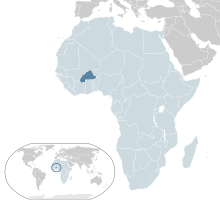2015 Burkinabe coup d'etat
| 2015 Burkinabé coup d'état | |||||||
|---|---|---|---|---|---|---|---|
 |
|||||||
|
|||||||
| Belligerents | |||||||
| Regiment of Presidential Security |
|
||||||
| Commanders and leaders | |||||||
| General Gilbert Diendéré |
Michel Kafando Yacouba Isaac Zida |
||||||
| Casualties and losses | |||||||
| 11 killed in total | |||||||
Coup failed
The 2015 Burkinabé coup d'état was launched on 16 September 2015 in Burkina Faso, when members of the Regiment of Presidential Security (RSP) – a controversial autonomous military unit, formed under President Blaise Compaoré – detained the country's government. Among those detained were the transitional President Michel Kafando, Prime Minister Yacouba Isaac Zida (who was also the former deputy commander of the RSP), and numerous members of the cabinet. This transitional government was formed in the wake of the 2014 Burkinabé uprising, when a popular movement overthrew the long-time president Compaoré, who himself had come to power in a 1987 coup against the left-wing leader Thomas Sankara. New general elections were planned for 11 October 2015.
The RSP was successful in seizing control of Ouagadougou and proclaimed the establishment of a new junta, headed by General Gilbert Diendéré, to oversee the transition to new elections. The coup leaders denounced the transitional government's electoral law, which barred supporters of Compaoré from participating in the elections, and promised to allow all prospective candidates to run. However, the junta failed to consolidate its authority across the country, and faced protests as well as intense pressure from regional leaders, and eventually from the regular army, to restore the transitional government. Ultimately, after the regular army entered Ouagadougou to confront the RSP, Kafando was restored as President on 23 September 2015.
In the days immediately prior to the coup, the Regiment of Presidential Security (which has previously been involved in several alleged coup d'état attempts during the Compaoré administration) had come under intense public scrutiny. On 14 September 2015, it was reported that a commission charged with proposing post-uprising reforms had come to the conclusion that the RSP should be dismantled and its members redeployed. The report, submitted to Prime Minister Zida, described the RSP as "an army within an army".
...
Wikipedia
